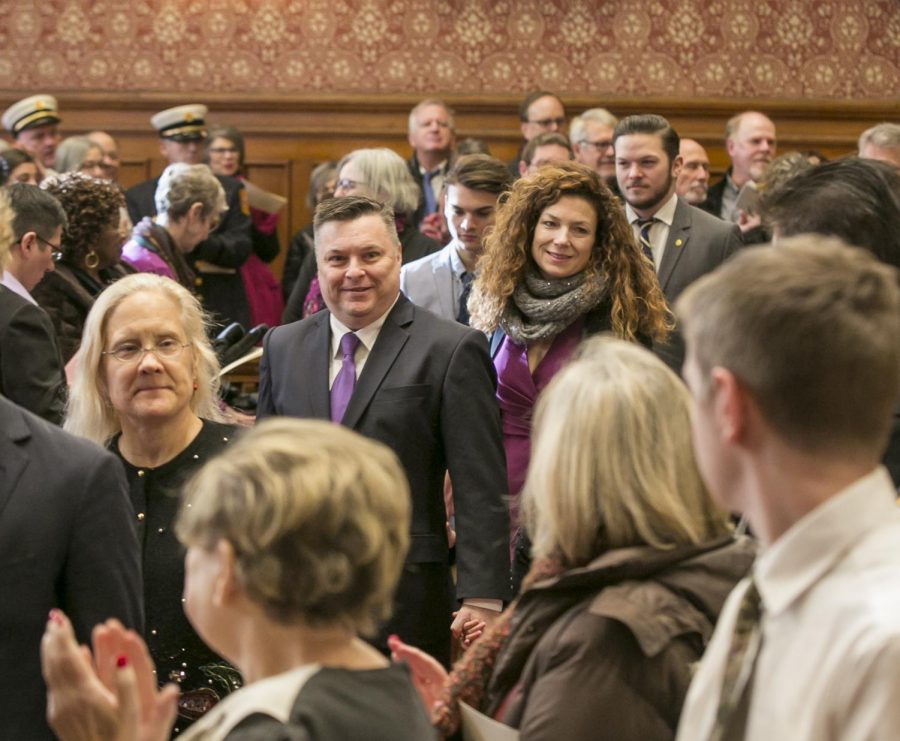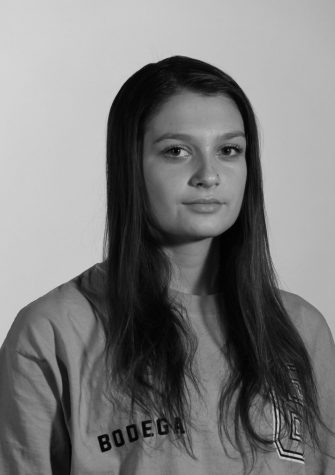Cambridge Names New Mayor
Interview with Marc McGovern ’87
Pictured: Mayor Marc McGovern (center).
January 30, 2018
Register Forum: What makes you passionate about politics in the city of Cambridge?
Marc McGovern: I grew up here, graduated from Cambridge Rindge and Latin, [and] my family has been in Cambridge—my kin to the fifth generation live here—so I really grew up in a household where there was a lot of community activism and things going on. I come from a long line of teachers. My mother helped start the Cambridge Women’s Commission [and] Mayor’s Summer Work Program. She worked for Mayor Duehay back in the late ’70s. And so I was brought up in this environment of public service—you work to make your community a better place. I like politics, but I really got into this much more so because of my love for this city. I don’t want to be governor. I don’t want to be senator. It’s really about helping my community and working to make my community a better place for everybody.
RF: What’s your favorite thing about Cambridge?
MM: I just love that we’re a big enough city where there’s lots of stuff to do, but you can’t walk down the street without seeing somebody you know. … I mean, it’s the only place I’ve ever known and the only place I’ve ever lived, so maybe it’s different if I had been in other places, but this is home, and I feel comfortable in every neighborhood, in every part of the city. I love that we are a socially conscious city. We’re not perfect, and no city is perfect, but we’re continuing trying to do better and to do more, and it’s a very exciting place to live.
RF: Could you talk about your affordable housing plans, and what those plans really entail?
MM: There are cities all across the country struggling with this—there’s no simple fix or easy answer. It’s also something that vibrant cities, cities that people want to live in—cities that have good schools, low crime, good city services—[are experiencing]. They’re attractive places. So, people want to live here. There are more and more people coming, because we have a strong job market, we’re a great place to live—and so part of this problem is we have a supply and demand problem. We have a lot of people who want to live here and we don’t have enough housing to meet that demand. The whole region doesn’t; it’s not just a Cambridge problem.
So we have to build a lot more housing of all types, because the Boston Regional Housing Report Card—this is done by housing experts in the area—says that you start to see rents come down when you have a 5% vacancy rate in your apartments in your city. Cambridge is at about 3% vacancy rate, a little bit less, so there’s this sort of threshold that the experts say you need to reach, and we’re not there yet. So, some of [the housing solution] is building more housing of all types.
One of the things I’m really proud of [is] last term I worked very closely with then-Mayor [Denise] Simmons around our inclusionary zoning percentage. That is the percentage that, when you see these new developments being built—any residential development ten units or more—they have to turn over a percentage of those units to the city for our affordable housing program, and it’s completely subsidized by the developer. That percentage was 11.5% for about 20 years. Mayor Simmons and I led the charge to raise that to 20%. So we almost doubled the amount of affordable housing that we’re actually going to get for free, because the developer pays for all of it. So, that’s something that’s going to bring in a lot more affordable housing.
So you build more housing, you strengthen the programs you have to create more affordable housing, and then the other thing is: How does the city get more aggressive in acquiring property? Because when we own the property, we can then partner with an affordable housing developer, and instead of getting 20% affordable, we can get 100% affordable. I’ve sponsored some things around taking property by eminent domain that the city is now going to be building affordable housing on, [and] as the finance chair I worked with the city manager on the purpose of some property that’s going to be all affordable housing.
RF: As an advocate for the homeless, what have you done in the past to address the growing homeless population, and do you have any plans for continuing that work in the future?
MM: The metro Boston area is funny in the way that if you picked up Boston, Cambridge, Somerville, Everett, [and] Chelsea and you moved us almost anywhere else in the country, we would be one large city. Here, we’re these little fiefdoms, these little cities—we have our own form of government, we have our own identities, and we don’t talk with each other. Homelessness is a regional issue. The people you see on the street in Cambridge might be on the street in Boston the next night, or Somerville the night after that. I brought together Boston, Cambridge, Somerville, Medford, and Malden to have the first regional conversation on homelessness. We’re still meeting. We’re talking about: How do we advocate as a region? How do we better coordinate services? So that’s one thing, trying to get us to start talking with each other. The other thing is, [January 9th] we have a meeting on opening the city’s first warming center for the homeless.
I try to look at short and long-term solutions. Long term, to address homelessness, we need to build more housing, [and] we need more transitional housing. Somewhere you [could] have ten apartments in a building for people who are homeless, dealing with alcoholism, and you have services for them right in the building. So they have support right there, so that works. That’s sort of a long-term—that’s not easy to do.
But short term is we have people who are freezing. A lot of them won’t go to shelters, because shelters can be unsafe. Particularly, [there are] women who don’t feel safe in shelters. And a lot of shelters won’t take people. So I went to the city manager and I said we need a warming center. There’s one in Boston and it’s a place that’s open at 7:00 at night to 7:00 in the morning. It’s a place where people can get a meal, get a hot cup of coffee, stay the night. They can leave if they want. I want it professionally run, so that there are social workers there that can maybe help set them up with other services. We got a couple hundred thousand dollars in the budget for it, and it’s opening January 16th. …
RF: Where is the warming center going to be?
MM: In the senior center, on Mass. Ave., right across from City Hall. Looking forward, I certainly want to continue to do the less complicated things—to make people’s lives better—but it’s also going to be really tackling this question of how … we make addressing homelessness part of our housing plan. Because now, it’s kind of an add-on. But, we really need to make it part of the conversation, and also challenge community members. It’s very easy to talk about how progressive we are until you’re asked to sacrifice something. People will come to me and say, “We need more housing for the homeless,” and then when we say, “Yeah, but it’s going to be near your house,” [they say,] “Well, maybe, you know, it’s gonna cause traffic, it’s gonna be this, it’s gonna be that,” and people find reasons not to do it. We have got to be better, and as a community we can’t just talk about our progressive values, we have to live our progressive values. And I’m going to challenge us on that. And hopefully people will rise to the occasion—I think they will—because we’re a progressive community.
RF: How can students get involved in something like that, the warming center—or, really, anything else in the sphere of Cambridge politics?
MM: I really recommend that young folks—”young folks”, my god, I sound like I’m 100 years old—that you attend meetings. It’s not the most exciting stuff. There are meetings that go on for a while; sometimes you’re talking about a curb cut for somebody’s driveway and it’s not as exciting as being on your computer. Or hanging out with your friends. But this local government is where the decisions get made that impact your life in the greatest way. …
Come to Council meetings. Every City Council meeting, the public is allowed to comment on something that is on the agenda. So if there’s a housing issue, or something that is important to you—whether it’s school stuff for the School Committee, or housing, or homelessness—if you see something like that on the agenda, come! And say, “Look, this is important.” Because, if we don’t hear from you, we don’t know. If you have other issues that you feel aren’t being addressed, contact us.
My door is always open, as someone who graduated from Rindge … I have a son who’s at the high school now, one who graduated, and two who will be up there eventually. Education and the Cambridge Public Schools are extremely important to me. And so, I want to hear from you guys, because at the end of the day, the adults can talk all they want about what they think should happen, but you’re living it. We need to hear from you.
RF: What are you hoping for the City Council to accomplish during your term as mayor?
MM: I really want to make progress on housing issues, social and economic justice issues—and that’s a big umbrella, so that’s homelessness, and wages, and hunger, and poverty. Cambridge has a higher poverty rate than the state average, most people don’t know that, and that’s using the federal guidelines for poverty, which are very low. When you adjust that for what it really costs to live in Cambridge, 48% of our kids are living in homes that are financially insecure. Which are defined as homes that don’t have enough money at the end of the month to save. [That’s] almost half of our kids in this city.
With the wealth that surrounds us, 500 people [are] on our streets and in our shelters every night. Death by overdose has doubled from 2015 to 2016. There are some communities where that would be insurmountable, because they don’t have the resources. We do. If I can look back at the end of my term as mayor and say that we have made significant progress in making lives of the most vulnerable in our community better, I’ll be happy.
This interview was edited for clarity and concision. This piece also appears in our January print edition.










